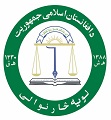
An effective, accountable and accessible justice system, based on the rule of law, is essential for security, economic development and the protection of fundamental rights in Afghanistan. Initiated in 2013, IDLO’s Justice Training Transition Program (JTTP) was one of the largest international training programs serving the Afghan criminal justice sector.
While the first phase until 2016 aimed to build the capacity of justice professionals through direct training and coaching, the program has since focused on supporting in-house training departments in Afghan justice institutions to progressively take responsibility for professional development, with the aim of making capacity building efforts in the Afghan justice sector sustainable in the long term.
Acknowledging the importance of individual capacity development as well as local institutional ownership, the program focused on the training departments’ strategic and operational levels. IDLO helped each institution articulate a clear vision for continuing professional development and put in place the necessary legal requirements for training activities. Furthermore, IDLO ensured that training personnel had the capacity and systems to carry out their work, and assisted in the development of training plans.
IDLO spoke to local trainers at the Supreme Court, the Attorney General’s Office and the Ministry of Justice of Afghanistan to find out what difference these in-house training departments are making.
Trainer, 30, Ministry of Justice

“Before becoming a trainer at the Ministry of Justice two years ago, I worked in academia and as a defense lawyer. Now I teach everything from the fundamentals of legal knowledge and writing to specific laws and legal codes.
On a normal work day, I get the materials ready and do some research in preparation for my classes. Sometimes I also collaborate with the training needs assessment team, if they have questions for me. Thanks to needs assessments and results-based performance, the quality of training has really improved over the years.
Having an in-house training department is important because no one is perfect. Everyone at times faces difficulties in their work or shows gaps in performance. The only way to overcome these is through learning and training.
That’s the part I love most about my job: it allows me to help people solve the problems they are facing. In one of my courses on anti-corruption, I told my participants that, according to Afghan legislation, being late to work is a form of corruption. So the next day, one of the participants mentioned this to his colleague who always arrives late. Now, both of them get to work on time.
In the future, I think, all training should be conducted by the government itself, and there should be a budget allocated specifically to capacity development.”
Having an in-house training department is important because no one is perfect.
Trainer, 48, Attorney General’s Office

“I’ve been working as a prosecutor in different departments of the AGO for almost 25 years. Since I became a trainer two years ago, I’ve worked with civil and military prosecutors – both new hires and long-standing employees – teaching them the Criminal Procedure Code.
I really enjoy having discussions with the participants in my class. The quality of training has greatly improved in the past years, and the number of courses is growing. The participants’ supervisors say their performance improves after they graduate.
In-house service training department help solve employees’ problems because the courses are easier to coordinate, and needs assessments are conducted more accurately and quickly. There is also a higher level of trust and familiarity, compared to an external organization.
We benefit from a form of peer pressure: the trainees think it will reflect negatively on them if they don’t show up for class or don’t participate actively, so they try their best to improve their professional capacity.
There is still much that needs to change in order for the people of Afghanistan to have a well-functioning justice system. We have to develop the capacity of justice professionals, make a concerted effort to fight corruption in the relevant institutions and ensure that rules prevail over relationships. But we must also increase legal awareness, promote merit-based recruitment and fight discrimination.”
We have to develop the capacity of justice professionals, make a concerted effort to fight corruption in the relevant institutions and ensure that rules prevail over relationships.
Trainer, 38, Supreme Court

“I used to work as a judge in Balkh, but for the last eight years I’ve been working in the North Zone, training Supreme Court judges.
In my opinion, the in-house training departments are valuable because they allow judges to carry out their duties while simultaneously developing their capacity.
I’ve seen a great change in the performance of my trainees. For example, after graduating, one judge conducted an open trial. Little by little, it helps ensure justice for the people.”
For example, after graduating, one judge conducted an open trial. Little by little, it helps ensure justice for the people.

